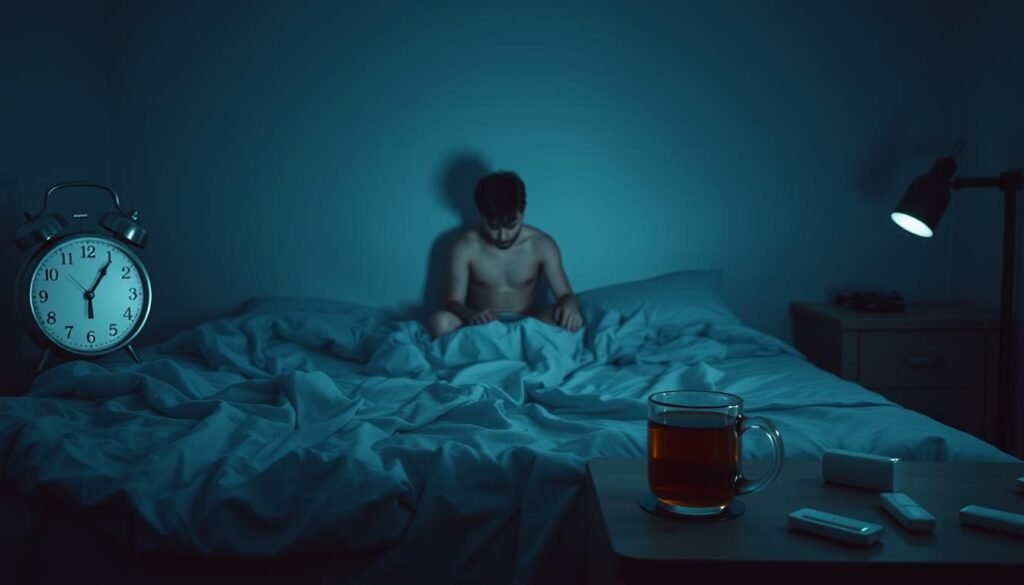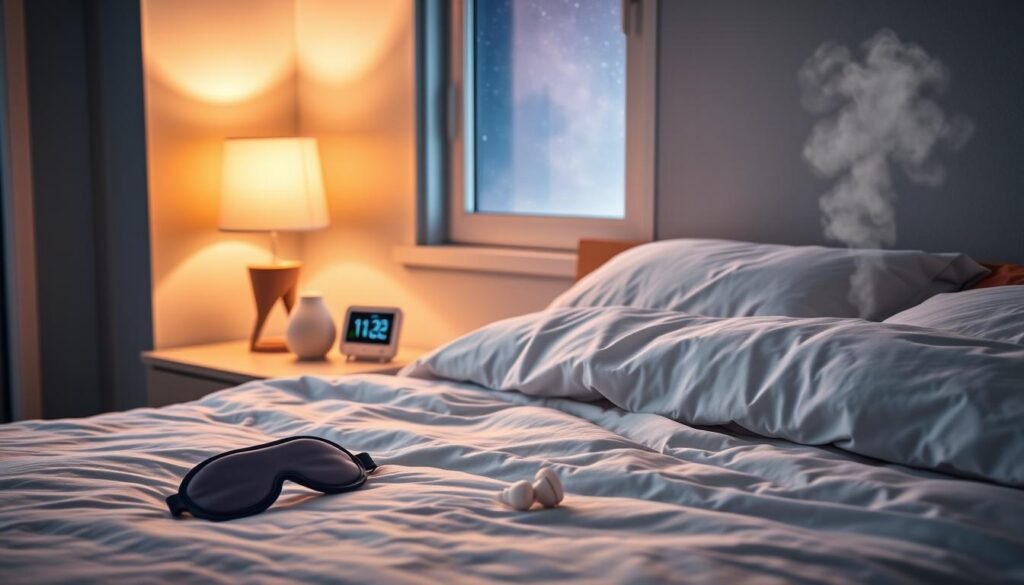Nearly 70 million Americans struggle with sleep disorders, and insomnia tops the list. This condition does more than just make it hard to sleep. It can greatly affect how someone functions daily and their overall health. The DSM-5-TR (Diagnostic and Statistical Manual of Mental Disorders, Fifth Edition, Text Revision) is key for diagnosing insomnia. It outlines what doctors look for to identify this issue.
This article will help you understand how insomnia fits into the DSM guidelines. We’ll cover the symptoms, how long the sleep issues last, and what this means for those dealing with insomnia. With more people realizing how insomnia affects mental health, it’s important to clear up any confusion.
Key Takeaways
- Insomnia is a big problem that impacts many people’s mental health.
- The DSM-5-TR has clear rules for spotting insomnia, including what symptoms to look for and how long they last.
- Knowing how insomnia is classified can lead to better treatment.
- If insomnia symptoms stick around for at least three months, it’s considered chronic.
- There are ways to treat insomnia, like cognitive-behavioral therapy.
- The effect of insomnia on someone’s day-to-day life shows why it’s so important to get the right diagnosis.
Understanding Insomnia
Insomnia is a common sleep issue that makes it hard to start or stay asleep. It also leads to unrefreshing sleep. This can really mess with your day-to-day life, causing problems with thinking and emotions. Knowing what type of insomnia you have is key to treating it right.
What is Insomnia?
Insomnia means you often find it tough to get enough sleep. It comes in two types: acute and chronic. Acute insomnia comes on fast because of things like stress or big changes in life. Chronic insomnia sticks around for three months or more. Figuring out which type you have helps pick the best treatment.
Types of Insomnia: Acute vs. Chronic
Acute insomnia doesn’t last long. It’s usually caused by stress or changes in your life like traveling. On the other hand, chronic insomnia goes on for a long time. It might need a deeper look by a doctor and more detailed treatment strategies.
| Type of Insomnia | Duration | Causes | Treatment Approach |
|---|---|---|---|
| Acute Insomnia | Less than 3 months | Life stressors, situational changes | Short-term strategies, lifestyle adjustments |
| Chronic Insomnia | 3 months or longer | Underlying health conditions, persistent stress | Long-term treatment, cognitive behavioral therapy |
DSM Insomnia Overview
Understanding insomnia with DSM-5-TR helps doctors diagnose it clearly. They focus on how it affects daily life, making it stand out from other sleep issues.
Introduction to DSM-5-TR Diagnostic Criteria
The dsm insomnia classification is key in psychiatric assessments. It looks at problems with starting or keeping sleep, or not feeling rested, for at least a month. People might struggle to fall asleep in 30 minutes for three to seven nights weekly, or wake up often at night.
Other issues include waking up too early and not feeling refreshed. For the diagnosis, these sleep troubles must last for a month and really affect someone’s day. Feeling less motivated, having trouble doing well, getting irritable, and feeling tired are signs. The impact must be serious, with a score of at least 2, to meet the criteria.
Research shows that insomnia varies among different people, showing the need for studies in specific groups. Knowing these criteria helps doctors see insomnia as a main problem. This leads to better plans to help those affected. For more information, check out this study exploring DSM insomnia in psychiatric patients.
Diagnostic Criteria for Insomnia
It’s very important to understand the diagnostic criteria for insomnia if you have trouble sleeping. The DSM insomnia guidelines list vital symptoms and rules needed to diagnose correctly.
Key Symptoms of Insomnia
People often experience different signs of insomnia. They mainly struggle with:
- Difficulty falling asleep: Taking more than 20-30 minutes to fall asleep.
- Difficulty maintaining sleep: Often waking up at night and taking over 20-30 minutes to fall back asleep.
- Early morning awakenings: Waking up too early and sleeping less than 6.5 hours.
For a sleep disorder diagnosis in the DSM-5, these symptoms must make daily life hard. Also, they shouldn’t be due to other sleep or mental health problems.
Duration and Frequency Requirements
To be diagnosed with insomnia, you must have symptoms at least three nights a week for over three months. This shows insomnia lasts a long time and is not just a short sleep issue. There are two types of long-term insomnia: persistent and recurrent. Short-term insomnia, however, lasts less than three months. Accurate tracking helps doctors make a correct dsm insomnia diagnosis.
Types of Insomnia in DSM-5

Understanding insomnia’s different types is key to managing it well. The DSM-5 lists three main types. Each has its own signs and how long it lasts. Knowing these differences is vital for a successful treatment plan against this common issue.
Primary Insomnia
Primary insomnia happens without other health problems being involved. People with it struggle to start or keep sleeping. It leads to a lot of stress. This problem goes on for more than a month, so it’s not just occasional sleep trouble. It’s important to know if it’s primary insomnia to fix sleep issues well.
Chronic Insomnia
Chronic insomnia means sleep trouble that sticks around for three months or more. It’s common, affecting lots of people. Over 50 million Americans face it. They don’t just have trouble sleeping. They also find daytimes hard, which affects life quality. Good sleep habits are crucial for managing chronic insomnia and improving sleep over time.
Acute Insomnia
Acute insomnia is short-term, often due to stress like losing a job. It can last days to weeks but is tough to deal with. Around one-third of adults face it sometime. For acute insomnia, therapy and support to tackle stress work well.
Daytime Impairments Caused by Insomnia
Insomnia makes it hard to start and keep sleeping, hurting how you think and feel. People with insomnia often feel very tired, moody, and can’t focus well. This makes everyday activities and enjoying life very hard.
Cognitive and Emotional Effects
Insomnia treatment shows sleep problems greatly affect day-to-day life. People with these issues may find:
- Concentrating is hard
- They get annoyed easily
- They have less energy
These problems can mess up school or work. About 15% of adults struggle with these issues. So, treating insomnia is key for health and happiness.
Impact on Work and Social Life
Insomnia doesn’t just impact you; it can also make work and social life tough. Studies show that:
- Sleepiness during the day can cause more accidents, like with cars.
- Not doing well at work can upset coworkers and bosses.
- A lot of people find it hard to keep up with friends, feeling lonely.
Since insomnia affects many life areas, it’s important to handle it well. Knowing how these issues show up emphasizes the need for a proper diagnosis and quick help.
Comparing DSM-IV-TR and DSM-5-TR
The switch from DSM-IV-TR to DSM-5-TR brought big changes in diagnosing sleep problems. DSM-5-TR gives clearer rules for diagnosing, making it easier to see insomnia as its own issue. This new version is designed to spot insomnia better and treat it right.
Changes in Diagnostic Criteria
The way insomnia is diagnosed changed. The phrase “another medical condition” is now used for clearer understanding of related health problems. Some major updates include:
- Duration requirement: The time needed to diagnose insomnia is now at least three months, longer than before.
- Frequency: The issue must happen more often, at least three times a week, to meet the new standards.
- Functional impact: The new rules look at how sleep problems mess with daily life, like work or school.
- Exclusion criteria: The updated guide leaves out certain medical and mental conditions that affect sleep differently.
New Specifiers Added in DSM-5-TR
DSM-5-TR added new ways to describe insomnia. This helps treat each case better. Here are the main additions:
- Episodic, persistent, or recurrent: These labels help understand how long the problem lasts, which helps with picking the right treatment.
- Comorbid conditions: The updates consider other health issues a person might have for more complete care. Now, 10% to 15% of people seek help for sleep troubles.
- Coding distinctions: Now, doctors can record the type of insomnia someone has more clearly. This makes finding the right treatment easier.
The detailed diagnosis approach in DSM-5-TR helps doctors treat sleep problems more effectively. Getting insomnia right is key for mental health treatment. It’s important because not treating sleep issues can lead to serious health problems, like heart disease or not being able to function well.
Coexisting Disorders and Insomnia
Insomnia often comes with other mental health issues, hurting a person’s well-being. People with insomnia usually deal with depression, anxiety, and PTSD. Knowing how insomnia plays into these conditions helps treat them better.
Insomnia in Mental Health Disorders
Studies show a strong two-way link between insomnia and mental health problems. Insomnia can make depression and anxiety worse. At the same time, having these mental health conditions can lead to poor sleep. The criteria for diagnosing insomnia highlight how complex this relationship is. It suggests insomnia needs its treatment plan, even when other mental health issues are present.
The Importance of Separate Diagnosis
Diagnosing insomnia on its own is key for helping patients effectively. Doctors are urged to assess insomnia separately. This way, they can come up with treatment plans that really address individual symptoms. Symptoms may include tiredness, trouble thinking, and mood changes. This method sees insomnia not just as a symptom but as its own issue that needs direct treatment.
| Mental Health Disorder | Common Insomnia Symptoms |
|---|---|
| Depression | Difficulty falling asleep, early morning awakenings, fatigue |
| Anxiety | Restlessness, racing thoughts, nonrestorative sleep |
| PTSD | Nightmares, hyperarousal, avoidance of sleep |
This approach lets mental health experts better understand and help people with insomnia. Realizing how insomnia affects mental health is crucial. It guides the overall strategy for helping and supporting patients.
Treatment Options for DSM Insomnia

Insomnia treatment often needs behavioral therapies, medications, and lifestyle changes. It’s crucial to know these options if you’re having trouble sleeping.
Cognitive Behavioral Therapy for Insomnia
Cognitive Behavioral Therapy for Insomnia (CBT-I) is a top way to fight insomnia. It changes sleep-related thoughts and actions. CBT-I techniques include:
- Stimulus Control Therapy: Creates a strong link between bed and sleep.
- Relaxation Techniques: Lowers anxiety and helps you relax at bedtime.
- Sleep Restriction: Reduces time in bed to sleep better.
- Remaining Passively Awake: Helps stay calm when you can’t sleep.
Studies show CBT-I offers lasting relief and is often better than sleep drugs. For more info on insomnia treatments, check out this resource.
Medications for Treating Insomnia
Medicines can be crucial for insomnia but use them with care. Popular prescription options include:
| Medication | Brand Name |
|---|---|
| Eszopiclone | Lunesta |
| Ramelteon | Rozerem |
| Temazepam | Restoril |
| Zolpidem | Ambien |
| Doxepin | Silenor |
Sleep medicines should not be used for a long time. They can cause dependency and side effects like sleepiness during the day. Even non-prescription sleep aids with antihistamines have drawbacks, such as confusion and urinary issues.
Exploring Sleep Hygiene Techniques
Better sleep hygiene is key for tackling insomnia. This means having good sleep habits for a better night’s rest. Important habits include:
- Keeping a regular sleep schedule.
- Having a calming routine before bed.
- Staying away from caffeine before sleeping.
- Ensuring your sleeping area is dark, cool, and quiet.
Adopting these practices can greatly improve how well you sleep. They work best when combined with insomnia treatment, such as cognitive behavioral therapy insomnia, and, if needed, medication. This full approach helps people overcome their sleeping difficulties more successfully.
The Role of Sleep Specialists
Knowing when to see a sleep specialist can majorly boost life quality for those with dsm insomnia. These experts are skilled in spotting and treating sleep troubles, especially when usual remedies don’t help. They’re crucial for folks whose constant insomnia messes with everyday life.
When to Consult a Sleep Specialist
Here are signs that a sleep specialist is needed:
- Lasting sleep issues for more than three months
- Extreme tiredness during the day that affects how well you do things or stay safe
- Increasingly bad symptoms even after trying typical insomnia treatments
- Having other problems like anxiety or depression that make sleep issues worse
- Concerns about sleep apnea or different sleep disorders
Finding Support and Resources
Finding help for managing insomnia is key. There are plenty of resources out there for those dealing with it, such as:
- Sleep centers linked with hospitals or health groups
- Online forums and community support groups
- Learning programs about sleep cleanliness and cognitive behavioral therapy for insomnia (CBT-I)
- Therapists who know how to deal with sleep problems
Using a team approach improves how well insomnia treatments work. Working together, mental health experts and sleep specialists tackle the complex issues of dsm insomnia. This ensures folks get care that fits their specific needs perfectly.
| Resource Type | Description | Advantages |
|---|---|---|
| Sleep Centers | Places that offer expert assessments and treatments | They provide expert diagnosis and access to all-around care |
| Support Groups | Places where people share their stories and advice | You get emotional help and handy tips from others |
| Educational Programs | Classes on good sleep habits and CBT-I | They teach you ways to sleep better |
| Therapists | Skilled in therapy for sleep and behavior issues | They offer care that goes after the main problem |
Impact of Lifestyle on Insomnia

Understanding the relationship between lifestyle and sleep quality is key in tackling insomnia. By following proper sleep hygiene, you can greatly improve your ability to rest. Good sleep habits include keeping a regular sleep schedule, making your sleeping area comfy, and keeping disturbances to a minimum.
Importance of Sleep Hygiene
Good sleep hygiene significantly affects sleep quality. It involves habits like reducing screen time before bed, avoiding caffeine late in the day, and establishing a relaxing bedtime routine. People who follow these practices often experience fewer insomnia symptoms. Adopting effective sleep hygiene can make a big difference in sleep quality.
Effect of Diet and Exercise on Sleep Quality
Diet and exercise greatly influence sleep quality, an aspect often ignored. Regular exercise helps the body relax, creating a sleep-friendly rhythm. Likewise, what you eat can impact your sleep. Foods with magnesium and tryptophan promote relaxation. A detailed study provides insights into how lifestyle changes can manage insomnia symptoms. For more information, read the full study here.
Research on DSM Insomnia
The study of insomnia, especially DSM insomnia, has grown a lot. Researchers now look at many aspects of this common sleep issue. To be diagnosed, one mainly needs to be unhappy with their sleep, either the amount or quality. Studies show one must have trouble sleeping at least three nights a week. This trouble should also seriously affect their day-to-day life. This emphasizes the importance of specific diagnosis criteria in insomnia research.
Current Studies and Findings
About 31.8% of people studied were found to have DSM-5 insomnia disorder. Those with insomnia faced more problems in daily life than those without it. Insomnia is also common among people with mental health issues, affecting 50% to 80% of them. For example, more than 90% with Major Depressive Disorder also had trouble sleeping. Insomnia is a key sign of depression.
Studies also link insomnia with anxiety, especially Generalized Anxiety Disorder and PTSD. Around 40% of schizophrenia patients also had insomnia. Since insomnia and mental health issues often occur together, understanding this can help diagnose properly. To learn about how insomnia is classified, check out the ICD-10 code guide for insomnia.
The Future of Insomnia Research
In the future, research will look into how insomnia and mental health issues affect each other. This might lead to new ways to treat insomnia. Researchers will study three specific areas—mental health issues, other medical issues, and other sleep disorders. This will help create better treatment plans. As research continues, focusing deeply on insomnia will stay important for good health care.
Conclusion
Understanding insomnia is crucial because it deeply affects our mind and daily life. About 31.8% of people suffer from DSM insomnia. This shows many are struggling more than those without this problem. Insomnia is its own issue, as stated in the DSM-5 diagnostic criteria. Thus, diagnosing sleep disorders accurately is key to improving lives.
Many psychiatric patients, 50% to 80% to be exact, report chronic sleep issues yearly. This highlights the need to treat insomnia not only as a secondary concern but as a main focus. With effective care, most people with insomnia can see a big change in their lives. Additionally, over 90% of those with major depression also report sleep problems.
Current research is linking sleep more and more to mental health. Insomnia is common during pregnancy and in people with anxiety and mood issues. It’s important for doctors to focus on diagnosing and treating insomnia properly. Helping people get treatment for insomnia can greatly improve their well-being and their life as a whole.